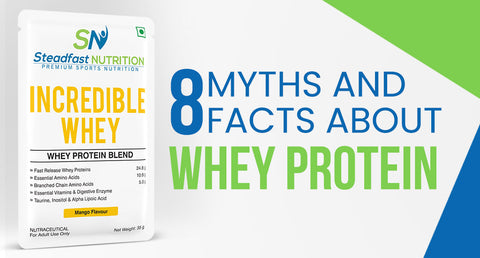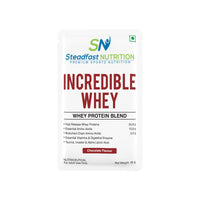Table of Content
2. Whey Protein is of 3 types:
3. 8 Myths and Facts about Whey Protein
4. Conclusion
5. FAQs
Whether you visit a gym, are a seasoned athlete, or simply someone trying to keep fit, chances are you have heard of or even used whey protein supplements. Whey protein, a high-quality protein, is popular among fitness enthusiasts and athletes due to its superior amino acid profile, quick absorption, and support for muscle development. Still, many myths about whey protein mislead and confuse people despite its great popularity and proven advantages.
We will debunk eight common myths about whey protein in this blog, with reasons for dispelling these whey protein myths. But first, let’s delve into how whey protein is made and the various kinds of whey protein available in the market.
What is whey protein?
Whey protein is the white liquid that gets separated after milk is processed into cheese. This whey water is further processed to obtain a dried powder form.
Whey protein is a high-biological value protein source, which contains all essential amino acids that help in muscle synthesis and repair and improve overall health. The body cannot make these essential amino acids and they must be taken through dietary sources. A fast-absorbing protein, whey protein is quickly used by the muscles, making it a great supplement for fast muscle recovery. Moreover, whey protein also helps enhance immunity and provides satiety, which helps manage weight. Taking whey is a convenient way to fulfil the additional protein requirements arising from exercise or intense training sessions. Simply mix whey protein with water to make a protein shake, and you're ready to go.
Whey Protein is of 3 types:
1. Whey protein concentrate (WPC)
Of all the whey protein supplements, whey protein concentrate (WPC) is the most popular. It has up to 80% protein content and small amounts of lactose and fat components. It is easier to digest than the other forms of whey protein and is less expensive too.
2. Whey protein isolate (WPI)
Whey protein isolate (WPI) contains a high concentration of protein (almost 90%), obtained by filtering whey protein concentrate to remove the excess lactose and fat components. The high protein, low-fat and low-carbohydrate content promotes lean muscle growth. However, WPI is more costly than WPC due to its higher protein content.
3 Whey protein hydrolysate (WPH)
Whey protein hydrolysate, or WPH, is a pre-digested peptide form of whey protein obtained by breaking down protein through the process of ultra-filtration and partial hydrolysis. This pre-digested form is more readily digestible and absorbable by the body, making it particularly beneficial for muscle repair and growth. Whey protein hydrolysate is the purest form of protein due to its high protein and negligible carbohydrate and fat content. For this reason, it is also more expensive than WPC & WPI.
Now let’s debunk the most common whey protein myths and get to know facts:
8 Myths and Facts about Whey Protein
1: Myth - More protein means more muscles
Fact:
While it is true that protein is essential for muscle growth and development, relying on protein alone will not help the cause. It is better to distribute your protein intake over the day and pair it with a proper workout regimen. Instead of simply overloading the body with protein,
focus on training consistency. Eating more than your body needs does not result in more muscle growth, as only a limited amount of protein is utilised by the body at a time and excess consumption may strain the liver or kidneys.
2: Myth: Whey protein can make you bulky or increase body fat
Fact:
Another prevalent myth about protein supplements is that they make you bulky or cause weight gain. However, the fact is that though proteins help improve muscle mass, weight gain is mainly the result of increased calorie intake. Research suggests protein consumption does not lead to a gain in body fat — rather it promotes lean muscle growth when combined with exercise or training. Weight gain is associated more with a sedentary lifestyle and excess consumption of fats and carbohydrates, leading to a calorie surplus.
3: Myth - Whey protein is consumed or used by bodybuilders only
Fact:
One of the biggest whey protein myths is that it can only be used by bodybuilders because it helps in bulking up. But in reality, whey supplements can be consumed by all those who want to meet their protein requirements when these remain unfulfilled through diet alone. Protein supplements may be used by people with an active lifestyle, weight watchers or those who want to fulfil their additional requirement of proteins like gym-goers, athletes, runners, or those involved in sports. The fact is that whey protein can help with muscle maintenance, fat loss, promoting satiety, and boosting overall recovery. Therefore, whey protein can benefit everyone, not just bodybuilders.
4: Myth - Whey protein is harmful for kidneys
Fact:
One of the most prevalent misconceptions about whey protein is that it harms the kidneys. However, when whey protein is consumed within the recommended dosage and combined with an active lifestyle and adequate hydration, it doesn’t strain the kidneys. People who engage in fitness activities and professional athletes may benefit from taking high amounts of protein, resulting in better repair and recovery of muscles.
5: Myth - Women shouldn’t take whey protein supplements
Fact:
A common stereotype about whey protein supplements is that they’re only meant for males engaging in bodybuilding and females cannot take them. However, the fact is that whey protein benefits both men and women by delivering essential amino acids that aid in muscle building and recovery. Whey protein not only benefits muscle integrity but also helps women improve their bone health, immunity, and weight management. Whey protein can also be consumed by women who want to fulfil additional protein requirements unmet through diet or those who perform high-intensity training.
6: Myth - Protein supplements contain steroids and are unsafe
Fact:
Protein supplements are made from natural sources of protein like whey, which is derived from milk. On the other hand, steroids are synthetic components that mimic hormones or accelerate the body’s hormonal function for early results. Protein powder is very different from steroids in various parameters like composition and effect on the body. Opting for high-quality whey protein from reliable brands and choosing the ones free from spiking agents and steroids are safe for consumption.
7: Myth - Whey protein is only effective immediately after a workout
Fact:
Whey protein is best taken after a workout for better muscle recovery but can also be used any time of the day. It is a myth that protein should be consumed within 30 minutes after a workout. The fact is that distributing your protein intake throughout the day can help in repairing muscles. You may consume whey protein in any form, like:
- as a breakfast smoothie
-as a mid-day snack
-before bed in the form of casein protein for overnight recovery
-or anytime during the day
8: Myth - All whey proteins are the same
Fact:
The quality and purity of all whey protein differs with their composition and formulations. Protein powders are not all made equal, some may be adulterated with poor quality ingredients, fillers, heavy metals, or deceptive labels. The varied forms, including whey protein concentrate, whey protein isolate and hydrolysate are formulated for targeting different goals. You may choose the best whey protein by prioritising your requirements looking out for the best parameter:
-Protein content per serving
-Selecting between three types of whey protein based on processing: Concentrate, isolate and hydrolysate.
-Third-party testing and certifications for quality.
-Transparency in labelling and ingredients used
-Lookout for artificial additives and fillers
- Check for allergens
Looking for best whey protein you can find one of the best whey protein supplements from SN’s website, trusted and admired by athletes and fitness coaches.
Conclusion
Protein isn't a miracle supplement, but when taken as directed, it can be very effective for meeting your daily protein goals, which change as per age, physical activity level and dietary intake of protein. Whether you want to improve muscle mass, manage weight or simply enhance your workout performance choose a protein supplement as per your needs. It is easier to use whey protein effectively if you know the facts and don’t fall for the myths about whey protein. Always pick the best whey protein for your goals and lifestyle, and combine it with regular exercise and a healthy balanced diet.
FAQs
Q1. Is whey protein only for bodybuilders?
Ans: No, whey isn’t just for bodybuilders. It’s a convenient source of high-quality protein that supports muscle recovery, weight management, and overall health — for anyone, including athletes and fitness enthusiasts.
Q2. Can whey protein damage your kidneys or liver?
Ans: No, whey protein does not harm your kidneys or liver if consumed in the recommended dosage. Research shows that normal protein intake— even from high-quality supplements — is safe for healthy individuals. However, people with existing kidney, liver or other underlying health conditions should consult a doctor before use.
Q3. Does whey protein cause weight gain?
Ans: Whey protein alone doesn’t cause weight gain. It only contributes to weight gain when combined with a calorie surplus diet (consuming more calories than you burn) and if one is not physically active. In fact, it can help manage weight and build lean muscle when combined with strength training.
Q4. Can women take whey protein?
Yes, women can safely take whey protein. It helps support muscle growth, recovery, and overall fitness without making you bulky. It’s also beneficial for meeting daily protein needs and for active lifestyles and weight management.
Q5. Is whey protein a steroid?
No, whey protein is not a steroid. It’s a type of protein available as a dietary supplement made from milk during the cheese-making process. Steroids are synthetic drugs that mimic hormones, while whey simply provides protein to support your body’s functions like muscle development and recovery.


